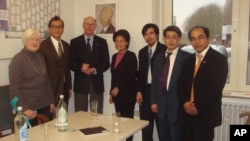Cambodian political observers say that opposition leader Sam Rainsy, who was removed from the National Assembly last week, will need to look for concessions with the ruling party if he is to return to politics.
Sam Rainsy is facing several criminal sentences related to the uprooting of markers on the Vietnamese borders and the publication of a map on his website alleging Vietnamese encroachment into Cambodian territory.
Kem Sokha, the president of the minority opposition Human Rights Party, said Sam Rainsy must now “apologize” or make other overtures beneficial to the ruling party if he is to return ahead of 2012 and 2013 elections.
“That’s what we see so far as political compromises,” he said.
Similar concessions were made by Prince Norodom Ranariddh ahead of his return from exile on graft charges ahead of the 2008 national elections, he said.
Such concessions can include a written apology or clarification to Prime Minister Hun Sen, he said.
The National Assembly ousted Sam Rainsy from his seat as representative of Kampong Cham province last week, after the Supreme Court upheld a criminal conviction against him. He still faces a court battle for disinformation after publishing a map on his website lower courts have found were fabricated.
Sam Rainsy has said the maps accurately show Vietnamese encroachment, a politically volatile accusation. Vietnamese officials have denied any encroachment has taken place.
Independent analyst Chea Vannath said political reconciliation is still possible, although she did not specify what that might mean.
Nhiek Bun Chhay, secretary general for the royalist Funcinpec party, said an apology would allow Sam Rainsy to return.
Sam Rainsy told VOA Khmer recently he will not apologize and that he feels justified in his claims that Cambodia is losing land to Vietnam. However, he said he is still looking for national or international solutions.
“I took the lead to defend the national interest, so the national interest is political,” he said.
Hun Sen has said Sam Rainsy’s case is a legal matter for the courts, not a political matter for the executive branch.
Cambodian People’s Party lawmaker Cheam Yiep echoed that position in an interview, saying the charges against Sam Rainsy are legal, not political. And his removal from the Assembly was done on legal grounds, Cheam Yiep said.
He reiterated claims that Sam Rainsy would have to write Hun Sen, who has the power to request a royal pardon for crimes.
Sam Rainsy said in an interview his removal from the National Assembly was a breach of the law, because he was voted in by his constituency. The move will likely bring international condemnation, he said, and ultimately strengthen his party.
Ruling party officials have “openly exposed themselves as people who don’t understand the law, who don’t understand democratic principles and who are suppressing the constitution,” he said.
He said he was similarly removed from the Assembly in 1995, but his party garnered even more support in subsequent elections.
“I believe that in 2013, there will be a change, and the Sam Rainsy Party will be stronger and stronger,” he said.
The Sam Rainsy Party currently holds 26 of 123 seats in the National Assembly. His removal from the National Assembly has prompted little international reaction so far.




